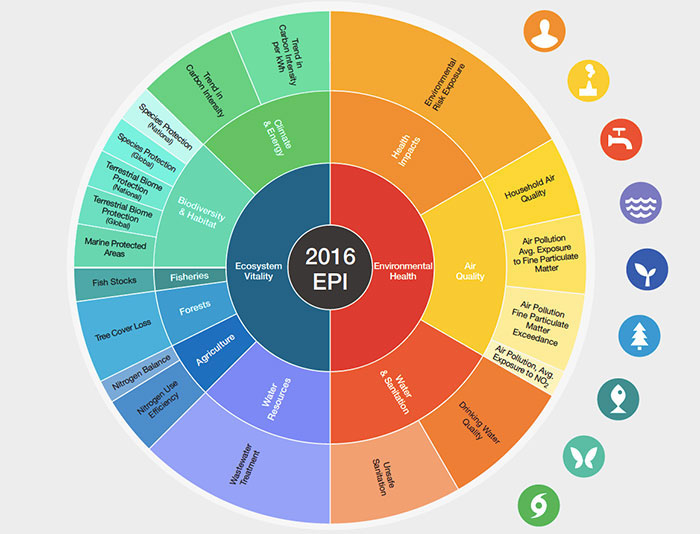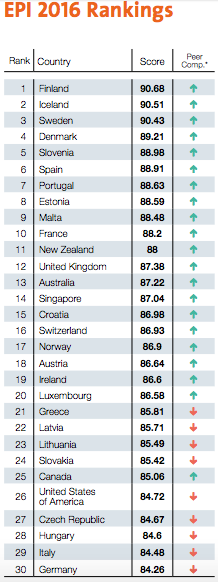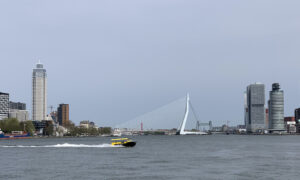This all gets a little predictable: Another university, corporation or public interest group releases a list of the happiest nations, most literate nations or nations with the best healthcare. And invariably, Europe dominates.
We’ll here’s another one: Researchers at Yale University in New Haven, Connecticut just released their 2016 Environmental Performance Index, and – shocker – the Top 10 countries are all in Europe. You have to go to No. 11 before New Zealand appears, which surprised us. What’s also a bit surprising is that the United Kingdom is No. 12, with Australia No. 13.
 North America doesn’t do all that well, with Canada No. 25 and the United States No. 26. Though both are way ahead of Germany at No. 30 and the Netherlands at No. 36. There is, of course, a correlation between heavily industrialized countries such as Germany (autos, chemicals and heavy machinery) and Holland (oil refineries and heavy manufacturing including truck production) and a pristine environment. China is ranked No. 109, dinged for poor (terrible) air quality as a result of industrial production.
North America doesn’t do all that well, with Canada No. 25 and the United States No. 26. Though both are way ahead of Germany at No. 30 and the Netherlands at No. 36. There is, of course, a correlation between heavily industrialized countries such as Germany (autos, chemicals and heavy machinery) and Holland (oil refineries and heavy manufacturing including truck production) and a pristine environment. China is ranked No. 109, dinged for poor (terrible) air quality as a result of industrial production.
Here are the Top 30
It’s a sweep for the Nordic countries, with Finland No. 1, Iceland No. 2, Sweden No. 3 and Denmark No. 4. When it comes to Scandanavia, no one has better environmental practices.
Bosnia is the last-place European country, ranked at No. 120, tied with the Caribbean tourist destination of Grenada. Go figure. And you seriously don’t want to live in sub-Sarahan Africa.
For the policy wonks among Dispatches Europe readers, the Yale research is a dream come true. Researchers literally scoured the scientific and academic worlds for the data, as you can read for yourself starting on page 35. The jargon goes from accessible to dense. But you come away with a solid undertanding of the scale of the biggest challenges humans face on a global scale: Protecting the seas and forests, and cleaning up the air and water.
Some really cool, if troubling, data points include:
• We’re denuding the planet. The annual rate of tropical forest loss has recently accelerated in many tropical countries including Cambodia, Sierra Leone, Madagascar, Uruguay, Paraguay, Liberia, Guinea, Guinea Bissau, Viet Nam, and Malaysia. Overall, tropical forests lost 9.9 million hectares of tree cover in 2014, “an area large enough to blanket South Korea with room to spare,” according to the report.
• The Earth has lost an average of 180,749 km2 (18.1 million hectares) of forest annually since 2000, according to the report. The rate of global forest loss has increased in the past 15 years, up 19 percent in the period 2012 to 2014 compared with 2009 to 2011, and 42 percent compared with 2001 to 2004.
• We’re emptying the oceans and seas. The oceans today contain half the fish that they did in 1970, and overfishing is the primary cause.
• Poland’s fisheries are on the verge of collapse. Data from Sea Around Us report that Poland’s fish stocks are 93 percent collapsed or overexploited, leaving the Baltic country in last-place in the 2016 EPI’s Fisheries category. The dire condition of Poland’s fish populations reflects a history of overexploitation and environmental destruction brought on by multiple actors.
• Several countries in Africa and the Middle East have road-safety crises. Oman, Saudi Arabia, Iran and Libya are among the ten worst performers in global road traffic mortality and injury rates.
• Indonesians are burning down their forest at an insane rate. From the report: Prescribed fires in Indonesia’s Kalimantan and Sumatra regions burned 21,000 km2 of forest and peatland in 2015. It released more CO2 emissions in a few weeks than Germany does in a year and sent noxious air pollution into cities and nations throughout the region. (Emphasis ours.)
• Polluted air causes more deaths worldwide than polluted water. Twenty-three percent of the world’s countries have no wastewater treatment.
• Twenty-three percent of the world’s countries have no wastewater treatment.
The Environmental Performance Index ranks countries’ performance on high-priority environmental issues in two areas: protection of human health and protection of ecosystems, according to the report. In a nutshell, it looks at – in American-speak – how good a stewards countries are of natural resources including agricultural practices including and fisheries, air quality and habitats.
The report uses rankings to accelerate positive change, or at least get the conversation going.
About the research:
The 2016 Environmental Performance Index is a project lead by the Yale Center for Environmental Law & Policy (YCELP) and Yale Data-Driven Environmental Solutions Group at Yale University (Data-Driven Yale), the Center for International Earth Science Information Network (CIESIN) at Columbia University, in collaboration with the Samuel Family Foundation, McCall MacBain Foundation, and the World Economic Forum.















